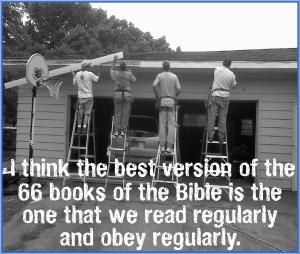It happened again the other day. A friend asked me which translation of the Bible I use.
- Because there are so many.
- Because translation does funny things to word meanings.
- Because we are so far in time and language from the original documents.
I was thinking about that question while reading from the Message.
Eugene Peterson wrote a paraphrase of the Bible, putting the ideas into late twentieth-century American language and culture. When he got to the section where Jesus is talking about building on sand and building on the rock, here’s how he expresses a couple of those images.
“These words I speak to you are not mere additions to your life, homeowner improvements to your standard of living. They are foundation words, words to build a life on.”
“But if you just use my words in Bible studies and don’t work them into your life…”
There is a difference between a Bible translation, a Bible paraphrase, and a Bible edition. Those differences matter. I can explain them for you.
 But as we read Peterson’s version of Jesus’ words, there is also a difference between a Bible word debater and a Bible word obeyer. There’s a difference between trying to figure out the shades of meaning to look for exceptions or contradictions and trying to figure out a simple starting point for acting. There’s a difference between intellectually knowing about all the different phrasings and experientially knowing the results of loving.
But as we read Peterson’s version of Jesus’ words, there is also a difference between a Bible word debater and a Bible word obeyer. There’s a difference between trying to figure out the shades of meaning to look for exceptions or contradictions and trying to figure out a simple starting point for acting. There’s a difference between intellectually knowing about all the different phrasings and experientially knowing the results of loving.
I have friends who won’t read the NIV (2011) or the KJV or the Living Bible or the ESV or the NIV (1984) or the Message. I sometimes sigh when they say that. Because I think the best version of the 66 books of the Bible is the one that we read regularly and obey regularly. And that we discuss together to understand better. And the one that we are humble about understanding.
Because Jesus has a word for people who read and don’t do. He calls us foolish.
josephruizjr
Well said Jon, I love your observation. The best translation, edition etc is one that we obey. Love Does!
LikeLike
Paul Merrill
Love it!!
LikeLike